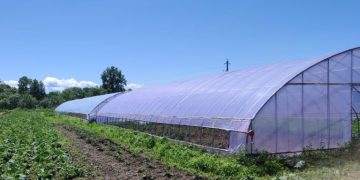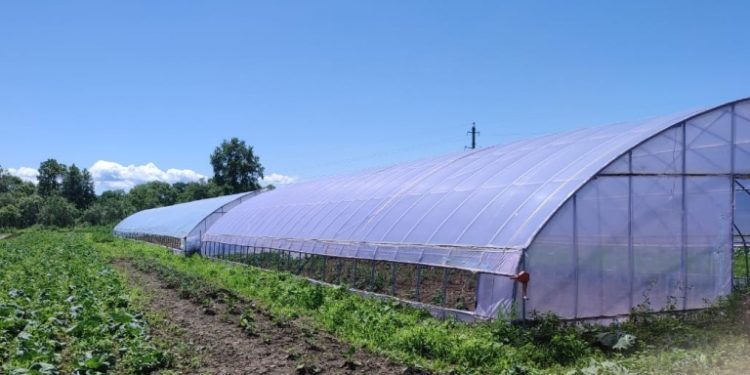The peasant farm of Sayod Pirov from the Birobidzhansky district has been providing the inhabitants of the JAO with fresh vegetables and potatoes for 15 years. And this year he plans to open the first winter agricultural season after the re-equipment of two vegetable greenhouses with a total area of 600 square meters. m. for year-round work. How a farmer manages to expand his business in difficult conditions and why he refuses Chinese workers – in the material of the corr. IA EAOMedia.
Sayyod Pirov from the village of Valdgeim is not new to agriculture.
- Our farm began with the cultivation of vegetables – cabbage, cucumbers, and some other crops. Approximately 40 hectares were allocated for them. Gradually, the areas were increased, and at the moment they have grown almost five times – up to 180 hectares, says Sayod Dilshodovich.
KFH Sayyoda Pirova from the village. Valdgeim, Birobidzhansky district. Photo: from personal archive
12
Now the farm grows potatoes, cabbage, beets, carrots, cucumbers, tomatoes, watermelons, radishes, and various greens. Vegetables are planted both in open ground and in two large greenhouses with an area of 400 and 200 “squares”.
The lion’s share of the farm’s land, about 150 hectares, is given over to soybeans. It is not for nothing that this oilseed crop in the Jewish Autonomous Region is called the queen of local fields.
Soybeans this year, by the way, would have been sown even more. But heavy rainfall made its own adjustments to the timing of the sowing campaign, which, in general, is not surprising. The JAO has traditionally justified its status as a zone of risky farming.
Plans also had to be changed due to increased production costs. It is easier to list what has not risen in price against the backdrop of anti-Russian sanctions.
- Mineral fertilizers, although we buy Russian, from local suppliers, have risen in price decently – by 40 percent. Plus considerable expenses for diesel fuel. Seeds for growing vegetables are also now more expensive, since almost all of them are foreign. Buyers should understand that a certain increase in product prices cannot be avoided. But, this situation is not only in our country, but throughout the country,” says Sayyod Pirov.
However, the agrarians are worried not so much by the prices for seeds, fertilizers and fuels and lubricants, as by the lack of labor force. And the point here is not at all a pandemic strike. Unlike a number of farms in the autonomy, Chinese guest workers have not been hired in this peasant farm before. “Smile and plow” always on their own. But the trouble is that lately even the locals have not been eager to roll up their sleeves and work on the land.
— We try to hire local residents, wages are growing. But young people do not want to work at all. Every year the situation is getting worse. There are no machine operators, ordinary workers, there are huge problems with all specialists. But we are increasing the area, this time we have allocated even more land for potatoes and cabbage. Somehow they planted everything, and now I’m scratching my head about how we will clean everything up in the fall. There is no idea yet,” the farmer complains.
KFH sells products in the region. As a rule, there are no sales problems. For many years, a retail outlet has been operating in the central Birobidzhan market, the farmer has been cooperating with popular chain stores and supermarkets. Do not exclude in the economy and the option of access to other regions.
“Let’s see how the goods will go this year. If we see that it is not possible to sell everything only in the Jewish Autonomous Region, we will try to expand to neighboring regions through cooperation with our trusted partners. Of course, I hope for support from the state. It would be nice if would help with the purchase of a combine, which will come in handy when harvesting potatoes,” says Sayod Dilshodovich.
For the coming winter, the farmer has his own plans – to re-equip both greenhouses for their year-round operation. Previously, vegetables ripened under the film only during the warm period. However, this year, for the first time, they plan to harvest the crop in the harsh Far Eastern frosts.
Undoubtedly, “perestroika” will require serious financial injections. But even at minus 40, the population will be able to buy fresh cucumbers, tomatoes and greens from the Waldheim garden.































